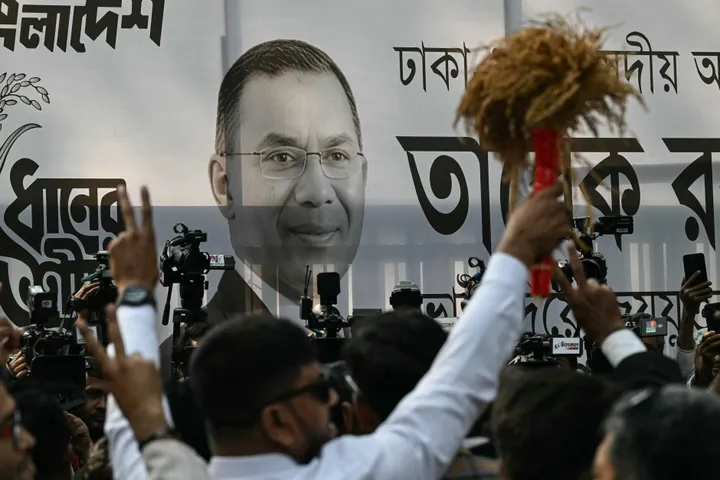ISTANBUL — Mesut Ozil, the German national team’s ace midfielder, wears the number 10 jersey, the number worn by Germany’s legendary Lothar Matthaus and Argentina's Diego Maradona.
Ozil's extraordinary skills on the field made him stand out on the field when Germany played against South Korea in the World Cup 2018, according to independent observers.
FotMob, a Norwegian soccer app which measures players’ performance in each game, gave 8.2 points to Ozil, whose skills have been compared with France's former captain Zinedine Zidane, who's of Algerian origin.
“Mesut Ozil created seven chances against South Korea – all from open play; the most by any player in a single game at the 2018 World Cup so far,” analysed Squawka Football, a British soccer stats website.
But Ozil was still the only one who was blamed for Germany’s loss against South Korea, which led to its disqualification from the tournament at the group stage. This has not happened to the German national team, the holder of the World Cup in Brazil in 2014, since 1938.
So why do Germans want to blame Ozil for their World Cup loss? Born and raised in Germany, Ozil is a practising Muslim with Turkish roots. His grandparents migrated to Germany from Turkey's Black Sea region. His backstory has often been played up by several football commentators. At times, his loyalty to the team has been questioned, and he's almost always been criticised for not singing the German national anthem before the kickoff. He's often responded to such jibes saying he silently makes prayers in Turkish for the triumph of the German football team, but for many observers and commentators, it's a sign of a bad omen.
“While the anthem is being played, I pray, and I am sure that this will give us strength and confidence to drive the victory home,” Ozil once said.
He's not alone in this. His teammates Sami Khedira, a Tunisian-German, also does not sing the anthem. Like Ozil, Khedira was blamed for Germany's recent loss too, even though at least half of Germany’s national team has players with migrant backgrounds.
One of the German fans hurled invectives at Ozil after the team lost to South Korea, a sight that brought a lot of discomfort to Ozil's fans. A group of German fans even raised a banner which read, "Ozil and Gundogan, go and play for Erdogan.”
It’s was an obvious reference to Turkish President Recep Tayyip Erdogan’s May meeting with Ozil and another Turkish-German footballer Ilkay Gundogan in London.
Both Ozil and Gundogan, another midfielder, play football in prestigious British clubs. Ozil plays for Arsenal and Gundogan plays for Manchester City. Ozil had previously played for Real Madrid, one of the world’s best soccer teams. When Erdogan was in Britain, which is called the cradle of football, he wanted to see both players there.
Erdogan had previously been prevented by German authorities to have rallies in the country which hosts more than three million Turks most of whom also have Turkish citizenship and voting rights for Turkish elections. According to June 24 poll results, most Turkish-Germans reportedly voted for Erdogan and the AK Party.
Much of the German press along with other Western media outlets have painted a distorted picture of Erdogan, calling him an autocrat with anti-democratic tendencies. Though Erdogan has governed Turkey for over 15 years, the anti-incumbency factor didn't affect Erdogan at all. Instead, he smoothly sailed to victory, gaining 52.59 percent of the vote in the June 24 presidential election.
Yet the German far right and other pro-establishment people want to associate Turkish-Germans who vote for Erdogan with anti-democratic values, labelling them bad Germans.
And Ozil and Gundogan became targets for meeting with Erdogan right before the Turkish elections.
Germany’s football association (DFB), which is the country’s top football institution, made a statement about the meeting, calling it “not a good thing.”
“The DFB, of course, respects the special situation for our players with migrant backgrounds, but football and the DFB stands for values that Mr Erdogan does not sufficiently respect,” said Reinhard Grindel, the DFB chief.
The country’s Chancellor Angela Merkel also criticised the meeting “as one which is prone to misunderstanding.” Several neo-Nazi groups pounced on the situation, raising hue and cry over the meeting.
“Before the World Cup began, neo-Nazis wrecked Ilkay Gundogan’s car [in Germany]. In the German national team, there are players with non-German ethnic origins. Neo-Nazis do not want a team dominated by non-Germans to be successful,” said Taner Demir, a 41-year-old Turkish-German businessman, who has lived in Germany for nearly 20 years.
“They want to use this photo [Erdogan’s photo with Ozil and Gundogan] as a leverage to force the national team to feature German players,” Demir, a Hamburg resident, told TRT World.
The Bild, Germany’s biggest newspaper, reported the incident on its headline the following day. “[Did it all happen] because of the Erdogan photo?” the headline asked.
It was not the first time German players of Turkish origin had posed with Erdogan. Ozil reportedly had several photos with Erdogan dating back to 2011, 2012, and 2016.
Merkel, who has been the country’s prime minister since 2005, also had a picture with Ozil after a memorable game between Turkey and Germany in 2010 in Berlin. Germany beat Turkey 3-0 and Ozil was one of the goal scorers.
Merkel made an unexpected visit to the Germany dressing room to congratulate the players.
Like Erdogan, she posed with Ozil who was booed by Turkish fans during the match because they expected him to play for Turkey rather than Germany.
Between the worlds
Caught between the two sides, Ozil has been booed out more than any other player. He has been booed by both Turkish and German crowds.
“Even though Ozil scored for Germany, he was being booed by German fans,” said Ali Gok, a 51-year-old Turkish-German nurse, who has lived in Germany for over four decades.
“There is no need to interpret this kind of rude behaviour. It demonstrates that Germans hate Turks this much.”
It was not long ago that Germany’s Hubert Burda Media group awarded Ozil with an integration prize. But now most of the German press is having a go at him.
“The main reason of the last incident [concerning the players’ meeting with Erdogan] is Europe’s anti-Erdogan stance. Why are they so against Erdogan? Because Erdogan wants to make Turkey a better country which does not make them happy,” Demir said assuredly.
Braving all the criticism, Ozil appears to have found a fine balance between his Turkishness and Germanness, a distinguishable blend, which defines his identity. Asking him to pick one side is like asking him to go against himself.
"I have the technique of a Turkish player," Ozil once said during a press conference but "the discipline of a German player."
This gives him an edge over his competitors. "Ozil is unique. There is no copy of him – not even a bad copy," said Jose Mourinho, Real Madrid’s former manager.
But not everyone is comfortable with embracing such identities. Joachim Loew, the coach of the German national team, cannot come to terms with the ethnic diversity of the German football team.
“I know that people with a migrant background have two hearts beating in their chest,” Loew said before the World Cup.
He also stated that two hearts cannot "reconcile" with each other all the time.
Amidst the climate of suspicion and discouragement, Ozil seems to have developed a coping mechanism. He keeps his head down, continues to give his heart to the game.
Ozil also tried to calm down rising tempers over his picture with Erdogan by meeting the German president Walter Steinmeier in the following days. Gundogan joined the meeting as well. “Ilkay Gundogan and Mesut Ozil wanted to meet with me. It was important to clear up any misunderstandings [related to the meeting with Erdogan],” President Steinmeier said on his Facebook page.
Some German politicians do recognise the majoritarian hostility toward the minority German Turks, who have been subjected to murders, torture and day-to-day humiliation over unreasonable notions of upholding "Germanness" in society.
Soon after President Erdogan was re-elected as Turkey's president, former leader of Germany’s prominent Social Democratic Party (SPD) Martin Schulz recalled the "dishonourable" acts carried against the Turks by Germany's far-right and ruling establishment.
“Erdogan and the Turks in Germany have an emotional bond because of Germany’s decades-long discrimination policies,” Schultz told Rheinische Post, a local German newspaper.
As a result, Germany’s Turks feel that Erdogan ensures them more security than Germany, Schultz observed.
Several Turkish-Germans TRT World interviewed echoed similar concerns with regards to Germany’s discriminatory policies towards minorities and migrant communities in the country.
“There has been talk about integration for years. But if you do not respect us ....," said Mustafa Demir, implying Germany's out of sync rhetoric toward integrating Turks and other minorities. "They were putting pressure over our players and the larger Turkish community because they were angry at Erdogan.”
Demir, 46, is a Turkish-German citizen, who moved to Germany as a six-year-old child. He now runs a private football company that deals with holding exchange programs between local Turkish and German football teams.
Commenting on the racist attacks on Ozil, he said the incident wasn't unpleasant for the German Turks.
“But at the end, this pressure hurt the German national team more than anybody else,” he added.
The World Cup controversy aside, German-Turkish relations have been at an unprecedented low. Historically, Turkey has always supported either Germany or Brazil in international football competitions, if the Turkish national team did not feature in such tournaments.
At the 2018 World Cup, Turkey seemed to have moved away from that tradition.
On a recent evening, when Iran played against Spain, the crowd in a cafe in Istanbul’s Esenevler neighbourhood watched the match with lukewarm enthusiasm.
When I asked them about Turkey's traditional support for Germany, an ally of the former Ottoman Empire, they responded with signs of anger on their face.
“I used to support Germany. After the recent incidents, I have been alienated from Germany. I now support South American teams,” said Burak Koc, a 30-year-old Turkish police officer.
“I don’t support Germany anymore because they adopted a racist attitude against Erdogan,” said Yusuf Aslan, another police officer, as he sipped tea in a traditional Turkish cafe.
Emre Yurdakul, Abdulaziz Ahmet Yasar, and Mustafa Gul contributed to this article.























